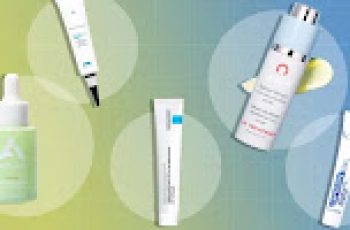
The Best Vitamin C for Melasma
Melasma is a chronic skin condition that causes dark spots on the skin due to a build up and uneven distribution of the skin pigment melanin. Thankfully there are a number of dermatologist treatments and skincare options available to even out skin tone and reduce hyperpigmentation.
Dr. Sheldon Pinnell discovered years ago that ascorbic acid (Vitamin C) helped skin make collagen. Since then we have learned so much about the many benefits of Vitamin C.
Vitamin C can be used as an antioxidant to help protect the skin from inflammation caused by sun and light exposure. It also is a tyrosinase inhibitor to help prevent the production of melanin. For this reason, Vitamin C is used in the treatment of melasma, however, it is not the best skin lightener to treat melasma because it’s tyrosinase inhibiting abilities are not as strong as other tyrosinase inhibitors like kojic acid, hexylresorcinol and arbutin. I prefer using Vitamin C in the Melasma Maintenance Routine for my patients and I choose one of these strong skin lightening products for the Melasma Treatment Routine. To learn about the two different types of melasma skin care routines- click here.
I love using Vitamin C orally to help treat melasma from the inside. I also often use it topically and orally to prevent skin aging. I just don’t think ascorbic acid is the best way to treat melasma for most skin types. With that said- it varies depending upon what your Baumann Skin Type is. Knowing your Baumann Skin Type is the only way to know if Vitamin C is the best treatment for your melasma.
What are the Benefits of Vitamin C in Skin Care for Melasma?
Vitamin C serums and vitamin C creams have become a staple of many skincare routines over the past decade, and it’s no wonder as this powerful antioxidant has many beneficial effects.
Much of the scientific research into the use and benefits of vitamin C in skincare centers on L-ascorbic acid, which is the pure form of vitamin C found in oranges. However, L-ascorbic acid quickly breaks down when exposed to air and light, so always be sure to purchase this type of vitamin C serum in an amber bottle with a small mouth or airless pump. Never buy it in a jar!
You should look formulations of L-ascorbic acid vitamin C serums in concentrations such as 10%, 15% or 20%, as these will have the greatest impact on evening out skin tone.
Don’t be cheap when it comes to Vitamin C serums. The most affordable Vitamin C serums are often ineffective. If they are in a jar- they are worthless. We recommend asking your dermatologist’s advice our follow our recommendation for the best Vitamin C serums for melasma because there are many subpar options that just don’t work.
Using a good formulation of vitamin C serum as part of your daily skincare routine can reduce the appearance of melasma and dark spots on the skin, even out skin tone, and even reduce the signs of aging on the face.
Why Are Vitamin C Serums So Expensive?
L-ascorbic acid is difficult to formulate in a way that protects the activity of Vitamin C because Vitamin C breaks down when exposed to air and light and loses its ability to protect the skin. When the Vitamin C product is formulated, this must be done in an air-free and light-free environment. Vitamin C also needs to be a low pH (acidic) to effectively penetrate the skin. This is why Vitamin C serums sting. Formulating Vitamin C properly is an expensive and patented process. The bottom line is- splurge on Vitamin C and save on cleansers, moisturizers and sunscreen. When we recommend a skincare routine for your skin type, we try to choose affordable products when possible but the Vitamin C serums will still be expensive. Click here to find out more about why these products cost so much.
What Is the Best Affordable Vitamin C Serum For Melasma?
Our favorite affordable Vitamin C serum is Skinceuticals Serum 10 AOX+. While some vitamin C serums can be slightly irritating, SkinCeuticals Serum 10 AOX+ contains L-ascorbic acid (pure vitamin C) and ferulic acid, both of which are powerful antioxidants and inhibit tyrosinase (the enzyme responsible for melanin production and dark spots on the skin), and panthenol (vitamin B5), which is an anti-inflammatory that soothes the skin and prevents worsening of melasma. This vitamin C serum will also help to reduce fine lines and wrinkles.
What Are the Best Vitamin C Serums For Melasma?
These are our favorites because of the concentration of Vitamin C, the pH and the way the products are packaged.
La Roche-Posay Vitamin C Serum
$44.99
Add to Cart
Obagi-C FX System C-Clarifying Serum
$140.00
Add to Cart
Obagi Force Field Kit with Professional-C Serum 20%
$189.00
Out of Stock
Obagi Professional-C Peptide Complex
$125.00
Add to Cart
CeraVe Skin Renewing Vitamin C Serum
$26.99
Out of Stock
ISDIN Flavo-C
$100.00
Add to Cart
ISDIN Flavo-C Ultraglican Ampules
$46.00
Out of Stock
ISDIN Hyaluronic Booster 10 Ampoules
$46.00
Add to Cart
ISDIN Melatonik® Restorative Melatonin Night Serum
$160.00
Add to Cart
La Roche-Posay Pure Vitamin C Face Cream
$54.99
Add to Cart
La Roche-Posay Vitamin C Serum
$44.99
Add to Cart
Obagi-C FX System C-Clarifying Serum
$140.00
Add to Cart
Obagi Force Field Kit with Professional-C Serum 20%
$189.00
Out of Stock
Obagi Professional-C Peptide Complex
$125.00
Add to Cart
CeraVe Skin Renewing Vitamin C Serum
$26.99
Out of Stock
ISDIN Flavo-C
$100.00
Add to Cart
ISDIN Flavo-C Ultraglican Ampules
$46.00
Out of Stock
ISDIN Hyaluronic Booster 10 Ampoules
$46.00
Add to Cart
ISDIN Melatonik® Restorative Melatonin Night Serum
$160.00
Add to Cart
La Roche-Posay Pure Vitamin C Face Cream
$54.99
Add to Cart
La Roche-Posay Vitamin C Serum
$44.99
Add to Cart
Obagi-C FX System C-Clarifying Serum
$140.00
Add to Cart
Obagi Force Field Kit with Professional-C Serum 20%
$189.00
Out of Stock
Obagi Professional-C Peptide Complex
$125.00
Add to Cart
CeraVe Skin Renewing Vitamin C Serum
$26.99
Out of Stock
ISDIN Flavo-C
$100.00
Add to Cart
ISDIN Flavo-C Ultraglican Ampules
$46.00
Out of Stock
ISDIN Hyaluronic Booster 10 Ampoules
$46.00
Add to Cart
ISDIN Melatonik® Restorative Melatonin Night Serum
$160.00
Add to Cart
La Roche-Posay Pure Vitamin C Face Cream
$54.99
Add to Cart
Can All Skin Types Use Vitamin C For Melasma?
Some sensitive skin types and hypersensitive skin types cannot tolerate the low pH (acidic) of Vitamin C. Rosacea prone, stinging skin and other sensitive skin types may get irritated by Vitamin C serums. It has not been proven but some patients report that Vitamin C causes acne breakouts- so I avoid it in my acne patients.
Wounded skin that has just had a procedure such as microneedling should not use L-ascorbic acid unless prescribed by your doctor because we have seen complications (granulomas and other side effects) from people putting Vitamin C on the skin after microneedling. It is usually Vitamin C creams that cause problems- not Vitamin C serums. But- to be safe- ask your doctor.
What is the Best Vitamin C Cream For Melasma?
We don’t recommend Vitamin C creams for melasma. The fatty acids in these creams can actually prevent skin-lightening ingredients from working properly. If you have melasma, it is best to use a Vitamin C serum or a completely different kind of skin lightening product. Never use a Vitamin C cream in a jar. Once it is open the air inactivates the ingredients and it is worthless.
How Long Until My Melasma Goes Away?
How long it will take for melasma to improve depends upon many things including:
Are you using the correct melasma skin care products for your skin type?
Do all of your skin care products work together to treat melasma instead of products inactivating each other?
Are you taking holidays from your tyrosinase inhibitors and alternating between a Melasma Treatment Regimen and a Melasma Maintenance Regimen
Are your melasma moisturizers and melasma cleansers chosen to help your Vitamin C serum work better to lighten the skin?
Are you combining the Vitamin C serum with other strong tyrosinase inhibitors?
Are you using PAR-2 blockers?
Are you avoiding the sun and blue light (from phone) by using tinted sunscreens (with iron oxide)?
Are you getting light or laser treatments that can make your melasma worse?
Are you avoiding intense heat like infrared saunas?
Are you pregnant?
Are you taking estrogen?
Are you making lifestyle changes to help your skin get rid of melasma?
It will likely take 12- 16 weeks for your melasma to clear- even if you are doing everything right. Don’t waste any time and money buying the wrong products for your skin. Vitamin C might not be the best product for your melasma!
Find out the best skin care routine for your Baumann Skin Type now!


